"A monk would never live like this." I said to Ellen.
"Take it easy." she calmly replied. "We only have two more nights."
It was the third day of our five day journey through southern Tibet to the Nepali border. We were at the Monastery Guest House. Ellen and I were sitting in the common room, or restaurant, of the place just 8 km from Mt. Everest Base Camp. We'd arrived here fifteen minutes earlier. I'd done a quick scan of the place. The steamy, overflowing outdoor toilets sat probably less than 5 metres from the kitchen. Our dormitory room wasn't heated. Neither was the common room where we sat. I picked up my Leon Uris novel, Redemption, and pretended to read.
"How can you read when you're shivering like that?" Ellen asked, seeing through my calmness. She'd brought along warm clothes for the trip. I made a quick calculation. I wouldn't be eating or using the toilet for the next 20 or so hours. And just 8 km from the mightiest of mountains, I'd seen all of it that I needed to.
"I'm going to bed. Wake me up when it's time to leave this place.
" I said. It was around 5:30 p.m.
At 2:00 a.m., I was awakened by Ellen rustling in her dorm bed that I'd pulled right up alongside mine. She was in a state of near panic.
"I can't breathe." she said.
"Stay calm, breathe in slowly, then out slowly. You'll be okay." I told her.
I knew what she was feeling. It had happened to me earlier when I was putting the beds together. At 5200 metres above sea level, simple tasks leave you feeling lungless.
The next thing I heard was Max, our fellow traveller, scraping the frost off our dorm room window.
"Ve must hurry. Ze sun vill soon rise over ze peak."
Ellen sat beside me, quickly lacing her shoes.
"You're going to walk 16 km back and forth to a mountain when just a few hours ago you couldn't breathe?" I asked.
"I feel fine now." she replied.
I pulled the covers over my head and quickly fell back into a deep sleep, dreaming of solid food and distant toilets.
The landscape west of Mt. Everest might be like the moon with snowy mountain peaks; the people who live there like a primitive version of the Flintstones.
Once we stopped in a place to take photos. We hadn't seen anyone in perhaps an hour. As soon as our Land Cruiser came to a halt two children, maybe four years old, appeared as if they had crawled up out of the earth itself. You often see lone women, some close, some far off, walking the plateau with big wicker baskets strapped to their backs. They collect yak dung to burn in their stoves or sell to others. Once their baskets are full, they bag it and leave it by the side of the road for the men who come by in horse carts to haul it off. A good size yak patty or turd log, or whatever it's called, gives off about as much heat when thrown into the stove as the main section of Saturday's Toronto Star. But that's all they have to burn in this barren land. They seem content.
.
Alternate published version of the above:
CHILLY NIGHTS IN TIBET Bedding down at a Lhasa monastery means outdoor privies and yak butter tea
National Post (Latest Edition)27 Dec 2008BY JACK DRURY Weekend Post —
Monastery Guest House had a pious yet homey sound to it, conveying a sense of comfort, warmth and welcome.
“A true monk would never live like this,” I said too loudly.
“Take it easy,” Ellen replied calmly. “We only have two more nights.”
It was the third day of our five-day journey through southern Tibet to the Nepal border. We were sitting in the common room of the Monastery Guest House, just eight kilometres from Mount Everest Base Camp. We’d been there for only an hour. In the common room, local men dressed in parkas stared at us over cups of yak butter tea, their ashtrays overflowing. The door was wide open, to let the cigarette smoke escape. I’d already inspected the facilities. Steamy, overflowing outdoor toilets sat less than five metres from the kitchen. Neither the common room nor our $10-a-night dormitory room was heated.
I picked up Leon Uris’s Redemption, hoping to bring out the true, strong Irish in me, but stopped reading after just a few sentences. My fingers were stiff from the cold. The open door wasn’t doing anything to cut the smoke. Looking out the frosted window, I made a decision. For the next 20 hours, I wouldn’t eat or use the toilet.
The best way to accomplish this would be by lying completely still — never mind that I was just eight kilometres from the world’s most famous mountain.
“I’m going to bed. Wake me up when it’s time to leave,” I said to Ellen. It was just after 4 p.m.
It seemed like forever since we’d climbed aboard the high-speed train in Beijing for the 48-hour trip to Lhasa, Tibet’s capital. I should have clued in when I realized that the sleeper compartments were smaller than usual, and that there were two extra beds crammed into them. Even squat toilets on the new but shaky high-speed train hadn’t fazed me. Our original plan had been to visit Lhasa for a few days, then head back down through southern China into Vietnam. But our German friend Max talked us into travelling overland to Nepal instead, with a stopover at Everest. A local travel agent provided us with a Land Cruiser and driver and arranged accommodation along the way. It sounded like fun, at the time.
Once in Lhasa, we’d made our way to Drepung Monastery, just outside the capital.
It was established in 1416 and was once the world’s largest monastery. In the 1950s, more than 10,000 monks had resided there. In 1959, when the Chinese invaded, only 300 escaped. Today, under a Chinese enforced capping rule, about 700 monks live in this almost tourist-free monastery. For a while, I wandered alone through the monastery, weathered but still in remarkable condition, half-expecting, half-wanting, to meet the ghosts of Drepung.
The following day, we’d driven beneath the endless snowy Himalayan peaks on the southern horizon east of Mount Everest. The barren landscape is like being on the moon, and the local people live like the Flintstones, without the amenities.
Once we stopped on a small switchback to stretch our legs. We hadn’t seen anyone in more than an hour. As soon as our Land Cruiser came to a halt, two children, maybe four years old, appeared, looking as if they had crawled up out of the earth itself. We often saw women walking the plateau with wicker baskets strapped to their backs. They collect yak dung to burn in their stoves or sell as building materials.
When their baskets are full, they bag it and leave it by the side of the road for men who come by in horse carts to haul it off. A yak patty, which resembles a good-sized hamburger patty, creates about as much heat as the front section of a weekday newspaper. It’s a mystery where the yaks get the food to make the dung on the barren, lunar-like plateau.
And now I was dreaming frozen dreams at Monastery Guest House. I was awoken at 2 a.m. by Ellen rustling in the dorm bed that I’d pulled right up alongside mine. She sounded panicky. “I can’t breathe,” she said.
“Stay calm, breathe in deep and slow, then out the same way,” I told her. “You’ll be OK.”
I knew how she felt. It had happened to me when I was putting the beds together. At 5,200 metres above sea level, simple tasks leave you feeling lungless. I fell back to sleep. The next thing I heard was Ellen scraping frost off our dorm window.
“I slept in. The sun’ll be up in half an hour,” she said as she frantically laced her boots.
It was a different panic now, that of missing the sunrise over the top of the world.
She was going to trek to Everest base camp and that was that.
I pulled the covers over my head and fell back into a deep sleep, dreaming of solid food and distant toilets.
The End
Ellen Yaks:
There were moments on the 8km walk to Everest Base Camp when my legs felt like jelly and I gasped for breath. I just wanted to lie down in the middle of the road and stay there. But if I did that I might be eaten by a yak and become yak dung in someone's stove. And I still wanted to see Vietnam, New Zealand and Fiji. So on I went.
At the foot of Everest, the mountain looks much smaller than expected but still ever so imposing. As I stood there looking at the top of the world, my legs suddenly felt stronger and my breathing was steady.
You may be wondering why anyone would subject themself to freezing temperatures, lousy food and disgusting toilets. The night before, as I gasped for breath, I wondered the same thing. Then I woke up in the morning, saw the bright blue sky and heard the mountain call. I decided that if I didn't make it to base camp, I wouldn't have accomplished what I came there to do. Was it worth it? Yes. Would I do it again? Never. Would I suggest it to anyone else? Probably not.

 Tigri, Tibet, China
Tigri, Tibet, China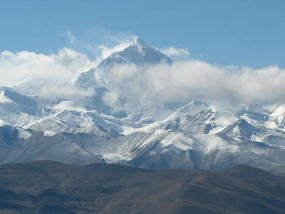
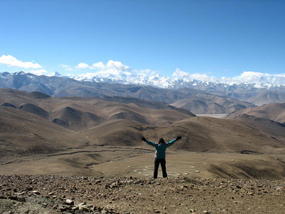
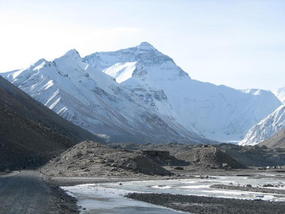
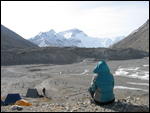
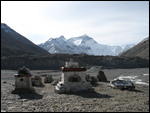
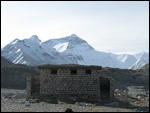
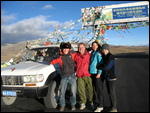
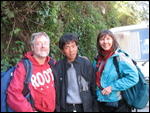



















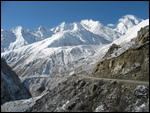
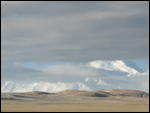
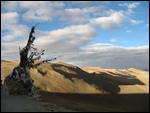
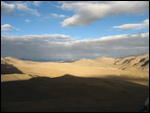
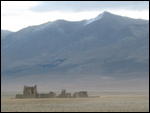
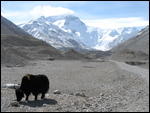
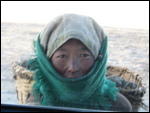
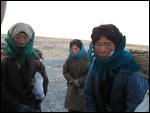
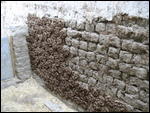
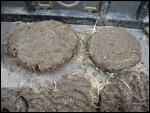
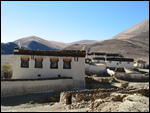
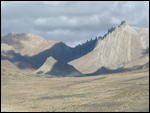
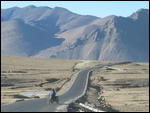
2025-05-22